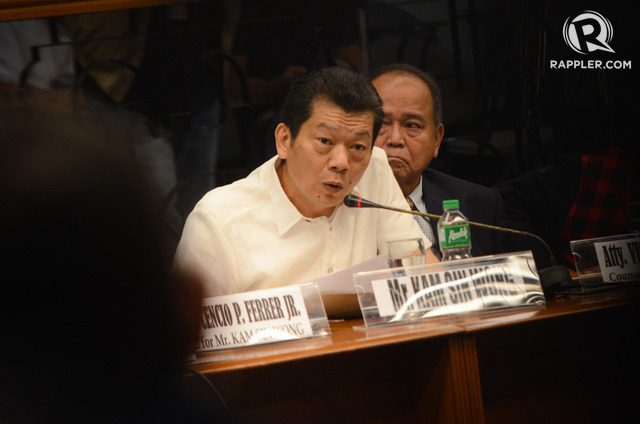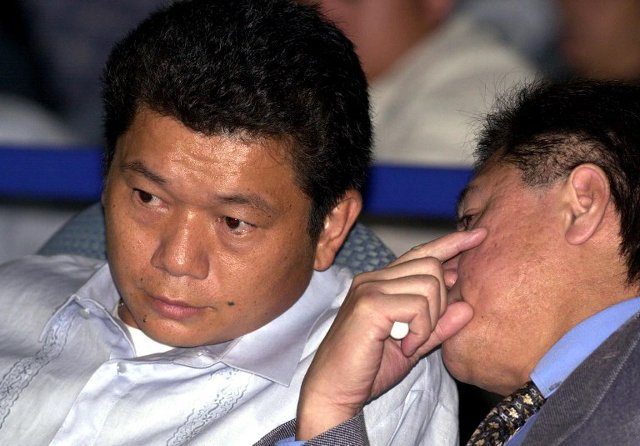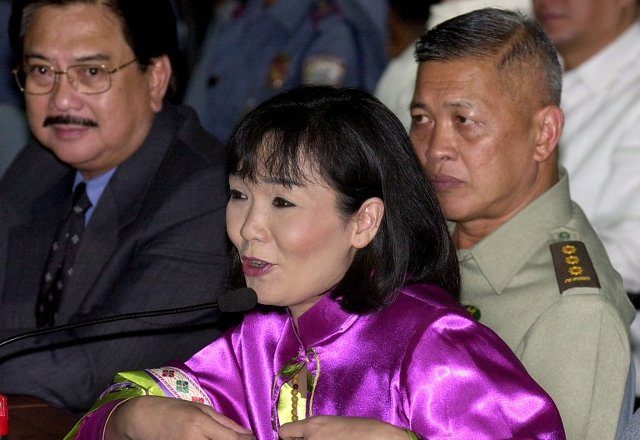SUMMARY
This is AI generated summarization, which may have errors. For context, always refer to the full article.

MANILA, Philippines – A central figure in the Senate probe into the $81-million Bangladesh Bank fund heist is Chinese casino junket operator Kim Wong, who admitted receiving P1 billion or $21.575 million of the stolen funds through his company Eastern Hawaii Leisure. (READ: 6 things we know about RCBC money-laundering scam)
Wong has denied involvement in stealing the fund via online hacking, and has so far returned a total of $9.8 million in 3 batches to the Anti-Money Laundering Council (AMLC). He claimed it was his fellow operators who brought the laundered money to Philippine casinos.
This is not the first time that Wong was called to attend a Senate investigation. In 2001, Kim Wong – also known as Kam Sin Wong – made his first appearance in a Senate hearing, when the involvement of policemen in organized criminal activities was being probed.
Senate records show that the 2001 Senate probe spanned 9 hearings: August 17, 23, and 29; September 3, 5, and 26; October 2, 5, and 22.
Wong’s alleged participation then was limited to transactions involving drugs. Fast forward to 2016 and the investigations bear some striking similarities.
Businessman
Wong first appeared in the Senate during its August 23, 2001 hearing. At the time, he was already alleged to be part of drug transactions that involved Chinese dealers and Philippine police pushers/buyers. Wong was also reported to have close ties with then newly-elected senator and former Philippine National Police (PNP) director-general Panfilo Lacson.
He attended the hearings accompanied by his lawyer, former solicitor general Frank Chavez.
Wong disclosed he’s a Chinese citizen, and had been in the country for only 29 years at that time.
Wong also established that he was the owner of at least 3 restaurants – Seaside Wharf, Tropicana Forest, and Pantalan – and a garments company.
Former police agent Angelo “Ador” Mawanay said during the August 17 hearing that he delivered shabu to Wong in April 1999 and January 2000 in his Seaside Wharf restaurant. Wong denied Mawanay’s claim.
There was very limited information about how Wong made it to the Philippines, but there are accounts that say he was sponsored by a Filipino-Chinese businessman who wanted him to help in the family business. After a few years, Wong made it on his own.
During his first Senate appearance, Wong revealed he had completed only first year college because he was a working student. “I finished first year college, and I don’t want to study anymore, so I worked as an agent at La Campaña Pabrika de Tabacos,” Wong narrated in Filipino.
La Campaña Pabrika de Tabacos, which has factories in Manila and Makati, was renamed Mighty Corporation in 1985. The company sells the much cheaper Mighty cigarettes. In 2014, the company was accused of “technical smuggling” when it artificially lowered the prices of its cigarettes.
Wong was not made to explain how he made the jump from being an agent to being a businessman.

Drug syndicate member?
Witness Mary Grace “Rosebud” Ong, an undercover agent who was assigned to monitor the illegal Chinese Triad syndicate, revealed in the August 29 Senate hearing that Wong was connected with groups she was monitoring.
“One of the Triad boss that I have dealt with is [Wong’s] friend and someone he deals with too,” Ong said during the hearing. The boss was later on identified as a certain “Mr Lee”, who was based in Hong Kong.
Wong denied being involved in a drug syndicate. He claimed that he was actually a supporter of former senator Ernesto Herrera and the Drug Watch Foundation. He was the foundation’s supplier of shirts.
“You can ask me about their shirts, all of them came from me. I can show you the receipts,” he said.
He even insisted that he had never tried nor seen drugs in his life, and that he doesn’t know anyone from his circle who’s a drug lord.
Interests, influence
Wong revealed in the hearings at least 3 of his interests: tennis, golf, and motorcycles.
He identified at least 3 golfer friends – Jose Go, Atong Cao and Pouch Wa – who helped him finance the construction of the P1.2-million-worth Western Police District building. All their names, Wong said, were even “marked” in the building.
“We thought that General [Avelino] Razon is doing a good job, so we supported him by creating a “one-stop-shop”, Wong said.
Wong’s interest in motorcycles led him to another enthusiast, PNP Chief Superintendent Francisco Zubia Jr. It was Zubia who introduced Wong to Lacson in 1997.
It was also revealed in the hearings that Wong helped finance the campaigns of former Manila mayors Alfredo Lim and Lito Atienza. Lim is running again for Manila mayor in the May 9 elections. Atienza last ran for mayor in 2010 and lost, but obtained a seat as Buhay partylist representative in 2013.

Other charges
Wong was dragged into other controversies apart from the alleged drug transactions.
Lim, who attended the August 23 hearing, accused Wong of being involved in drug deals and the May 12, 2000 killing of Angelito Sy – a police informant on drug-related operations.
“Sy was murdered because he told Wong on May 11, 2000 that he knew about the shipment of shabu intended for Wong. Wong got furious and told Sy that he should shut up and that he didn’t know what he was saying,” Lim told senators then.
National Bureau of Investigation (NBI) director Reynaldo Wycoco also attended the same hearing, and disclosed that Wong’s name was in the agency’s records – one for a swindling and estafa case, and another for violating a city ordinance.
Wong denied all the accusations against him.
Money laundering
In her testimony during the Senate probe, “Rosebud” Ong prepared statements and affidavits on multiple topics other than drugs, including money laundering.
Ong disclosed that prior to being an undercover agent, she used to work for the underground Binondo Central Bank, being “the one who controls all the couriers and smuggling of the dollars out of the country.”
The Binondo Central Bank was an underground remittance company formed during Martial Law, and was believed to have been dissolved in 1986. Ong revealed, however, that its operations continued.
At the time, the senators were not interested in dollar smuggling or money laundering. They said the hearings would only touch on drug smuggling. The transcript of the August 29 hearing shows that when Ong began to talk about the smuggling of dollars out of the country, she was reminded to focus on the issue of drugs.
No final report was released after the Senate hearings. – Rappler.com
Add a comment
How does this make you feel?
There are no comments yet. Add your comment to start the conversation.